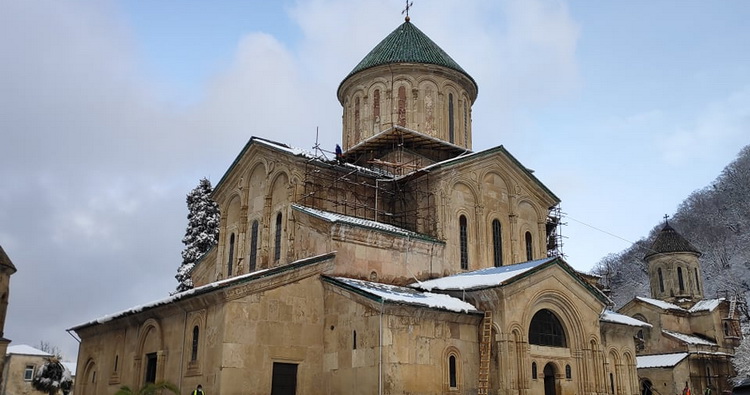UNESCO experts to issue recommendations for Gelati monument rehabilitation

Rehabilitation work on the roof of the Gelati monument has been under scrutiny since rainwater leaks were identified on the site last summer. Photo via National Agency for Cultural Heritage Preservation.
Professionals from the UNESCO World Heritage Centre will visit Georgia to issue recommendations on the ongoing rehabilitation of the Gelati Monastery Complex, following a fraught work on the site that resulted in damage to its newly installed roof and rainwater leaks last year.
Nikoloz Antidze, General Director of the National Agency for Cultural Heritage Preservation of Georgia, revealed on Monday his organisation was expecting the UNESCO team visit in early spring, calling it the "main" development in the events around the monument.
Antidze said his agency was in "daily communication" with the international body and would receive the team focused on roof structures, reflecting the issue on the UNESCO World Heritage Site in Georgia's west that emerged last summer. Defects in roof tiling being installed by a contractor company led to rainwater leak into the St Mary Temple, the principal part of the site, in July.
All issues relating to temporary roofing have been solved, but now our focus [...] is on the defective elements - for planning relevant actions - that led to these urgent measures" - Nikoloz Antidze
The national agency has since then fined and replaced the company working on the ongoing rehabilitation for failing to fix deficiencies in the work. The general director told local media the UNESCO team would issue recommendations for a "specific direction" for solving issues that led to the damage.
Types of research required for the solutions, and timescales related to the problem, would also be part of the visiting experts' directions, with a new company designated for the work to be presented to the public afterwards, Antidze noted.
Following last summer's damage and rainwater leaks the former contracting company - the Georgian Arts & Culture Centre - had set out to install a temporary structure over the monument's actual roof in the fall, to safeguard it while a new tiling was prepared for the St Mary Temple.
However, it was revealed last month winds had blown off the temporary roofing, with snowfall over the area coinciding with the latest damage. The national agency's replacement of the contractor followed the development.
In their comments about the initial rainwater leaks in July the Georgian Arts & Culture Centre have said the damage to tiling had been "impossible to predict" as none of the tiles later revealed to have failed had shown signs of visual defects during inspection after they were produced, and had undergone laboratory testing on "mechanical characteristics" before being used in the rehabilitation works.
 Tweet
Tweet  Share
Share